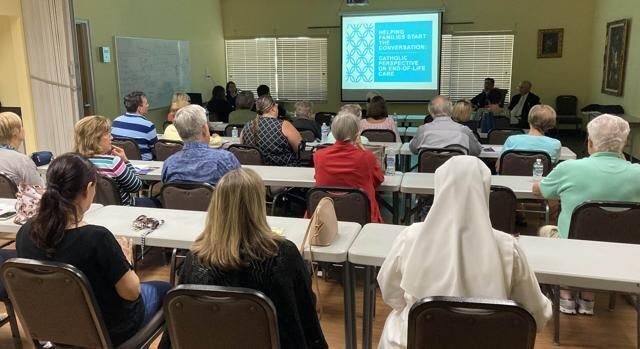
DELRAY BEACH | As you advance in age, a natural question is: What level of care do I wish to have when and if I become incapacitated? Those concerns should prompt an interaction with loved ones to let them know your wishes.
That was the focus of a Nov. 12 workshop, “Helping Families Start the Conversation: Advance Directives and Ethical Issues on End-of-Life Care,” presented by Father Dennis Gonzales, pastor of St. Vincent Ferrer Parish in Delray Beach, and Dr. Anthony Dardano, medical director of the Delray Medical Center and vice president of the Palm Beach Physicians Guild of the Catholic Medical Association.
Father Gonzales, who is a registered nurse with a master’s degree in bioethics, said, “Death and preparing about death is what I call an ‘elephant in the room.’ We don’t want to talk about it. Who wants to talk about death?”
Most people keep postponing the discussion until very late in the game to the point where it can’t be postponed any longer, often when a patient has entered a hospital. That is why it is important to have an advance directive in place, he said.
An advance directive is a set of guidelines detailing a person’s health care wishes when and if they’re no longer able to verbalize their desires. The directives should be written in advance by adults who know what they’re doing, with an understanding of the risks and benefits of medical procedures, he said. The directive (a link to a form is at the end of this article) contains two parts: the living will, covering life-sustaining treatments, nutrition, pain medicines and organ donation; and the appointment of a health care surrogate or proxy, someone who would make decisions about your care if you are unable.
“If you have a health care proxy or a surrogate, please inform that person that he or she is your surrogate,” Father Gonzales said. The person should know you, your values, faith and health care preferences.
He offered some conversation starters for how people can calmly and rationally broach the subject of death with their loved ones.
Both workshop presenters said many Catholics don’t understand the teachings of the church when it comes to end-of-life care. Many years ago, they said, when medical options to sustain life were few, issues involving care were more black and white. But today, with all of the advances in medicine, surgery and technologies, the ethical questions are more complex and prevalent.
“Right now, there is a lot of confusion, and when the patient is there experiencing imminent death, family members sometimes are at a loss on what to do,” Father Gonzales said. They may ask: Is it morally wrong to not pursue medical advancements that could help their loved one live longer, even if it’s just a few days?
The church has developed teachings about ordinary and extraordinary means of sustaining life that have been around for nearly 500 years, he said. Pope Pius XII and St. John Paul II developed those teachings further during their pontificates.
“The Catholic Church teaches that we are not normally obliged to pursue interventions that are really extreme, that are burdensome and whose risks outweigh the benefits,” Father Gonzales said. Treatment that is ordinary in one area of the world may be extraordinary in another place, he added.
Care that is categorized as ordinary includes nutrition and hydration, he said, as long as the patient can accept and benefit from the nourishment. Tube feeding may become an extraordinary means if given to a person who is actively dying. At this stage, Father Gonzales said, the body shuts down and is no longer able to assimilate feeding, which may cause complications such as repeated aspiration, pneumonia and infection.
Dardano, a member of St. Jude Parish in Boca Raton, said what is extraordinary now may be ordinary 20 years from now. “That’s what makes this very complex. Most of our lectures are on this extraordinary vs. ordinary care and discontinuation of life support. These are major decisions,” he said.
For more information on end-of-life care from a Catholic perspective, visit https://flaccb.org/end-of-life-care. For advance directive forms in English and Spanish, go to https://flacathconf.org/declaration-on-life-and-death.
To read this and other stories in Florida Catholic, click here.

